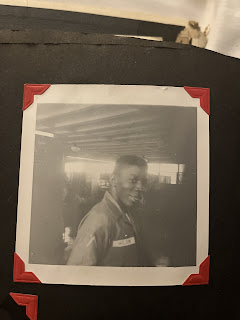Thirteenth.
So this evening, some friends and I gathered to watch Ava Duvernay's incredible, poignant prison documentary,
"13th" and it was indeed, a necessary wake up call to those who are still sleeping. Ava did a great job of showing timeline and giving multiple examples to prove her points were more than just "Black conspiracy." I feel so blessed to be woke to these things so this wasn't
the first time I was hearing these things but simultaneously so stressed
about the current and past state of affairs.
A friend who is an
architect brought up her mentor who is a head manager and architect for
all the prisons on the East Coast. ALL OF THEM. She was speaking with
him and asked how he could feel comfortable doing what he's doing
(they're both black). He responded that since he isn't a politician and
can't changes the laws around it, he tries to make prisons as
comfortable as possible, he tries to make them better. I HAD to say
something and speak on it for a moment. This man perpetuates the systems
that oppress his very people. Looking them up like animals doesn't make
it better if you give them bigger, nicer cages. Do the work, read the
materials. Prisoners don't want nicer prisons, they want not to be
prisoners. At all. In thinking about this, I truly
believe it comes down to intent. What is your intent? Is it to make
nicer prisons to house prisoners or to abolish prisons altogether? His
goal was to make prisons nicer and do what he can from the inside. I
appreciate his standpoint and his efforts but as for me, I aide more
with the abolitionists. Don't beautify the system or spruce it up, tear
it apart and make sure it doesn't return.
Another
point I felt the need to mention after watching this marvelous
documentary was in the form of a question: WHERE WERE THE WOMEN? I loved
loved loved the inclusion of Michelle Alexander and the amazing Angela
Davis but where were the incarcerated black women in all this talk of
the prison industrial complex and how terrible it is for blacks in
general and black men being portrayed as dogs? I feel that it was
wonderful and incredibly important to put women in the conversation as
those with knowledge and points of reference on this topic, in
particular black women. We need representation in every and all things.
But what about the daily struggles black women in prison face? And the
fact that they're being criminalized too? What about the representation
there? If you're going to talk about it, I feel you should talk about
all of it. Don't just speak on black men and how hard they have it in
American society but be mum on the subject of women experiencing the
same, if not worse, treatment, racialization and criminalization.
Another friend I was talking about this with said she understood my
point but felt that a separate documentary would be better to discuss
that topic. I do not agree. I'm not saying women need to have taken up
half the documentary but at least a mention, a sentence, a shoutout,
something. These are all issues America needs to be made aware of. The criminalization of African Americans is just as much of an issue today as it
was during slavery and Jim Crow and the still existent War on Drugs. It's not over by a
long shot.
Next and last point of discussion
is more of a comment on a comment. We were discussing how some of our
parents never taught us these things and how different we are from them
in terms of knowledge, passion, activism and what have you. I got a
little excited and someone said something to the effect of, "you in your
all black. Tell them about it!" (I happened to be wearing all black). I
thought this was cute since the Black Panthers were of course mentioned
in the documentary and, if for no other reason, their fashion aesthetic
is very much in line with mine. I feel that education about these issues and the real history of Black America is of paramount importance. Not just in the halls of greater education which is where I've gleaned this knowledge, but in Black parents teaching their children the truth. Informing children so they learn true, factual history, not just the 2-paragraph blurb in a junior high school history textbook that says, "slavery happened, then Emancipation happened, later Jim Crow happened, but you don't have to worry because we're past all that now." That telling is so wrong and incomplete and one-sided and white-washed it's disgusting but that is unfortunately the blindingly Caucasian-centered history we learn and country we live in. A couple weeks ago, in conversation
with someone who'd just visited the African-American Museum of Culture
and History, they said to me, "You know if there was a revitalized Black
Panther party, I think you'd join." For all my sweetness and calm
composure, I do get excited and passionate about things that truly
matter to me personally. All I can say, is that I would not be against joining if in fact the Black Panther party had a resurgence. Activism is on my radar.
PS. If anyone is looking for interesting things to read on these topics of the Black female struggle and criminalization in America for further education, I've included some links to articles and a book or two you might find useful.
Books
Danielle McGuire, At the Dark End of the Street
Angela Davis, Are Prisons Obsolete
Articles
Kimberle Crenshaw - Mapping the Margins: Intersectionality, Identity Politics, and Violence against Women of Color 
Comments
Post a Comment